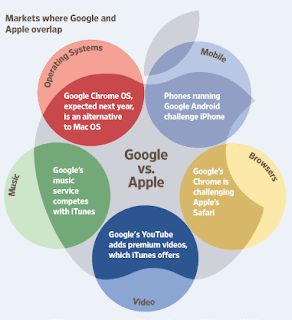Below is a time line of the main events that marked the interactions between Google and Apple. The latest significant episodes are Google's launch of music search, it's acquisition of AdMob and Apple's acquisition of Lala.
Looking at the timeline, it can easily be observed that Google took the offensive, while Apple has so far been on a defensive mode. Strategically, Google went for an indirect attack, by postponing to attack Apple frontally and by weakening it on the flanks. However, Google's most recent news, about the imminent launch of a fully Google produced Google Phone, leaves no misunderstanding on the company's intention: it is ready and willing to start a frontal combat with Apple.
Wall Street Journal offers a great overview of the markets in which Apple and Google overlap. Interestingly enough, in this fight of the titans, the companies are competing for the same allies - in our case the startups they acquired, such as lala and AdMob.
As juicy as this might sound for all the fans of strategy, warfare and of the technology world in general, I think it is premature to say Apple and Microsoft will start making love, and not war. First of all, the whole assumption is based on Microsoft's recent launch of a Bing app for the App Store. While this marks a (almost) first in the Microsoft - Apple relationship, it is not enough. For the simple reason that Microsoft HAD to launch the Bing app. Because whether the Redmond giant likes to admit it or not, App Store is becoming an increasingly important platform for software distribution. And if they want Bing to fight head to head with Google's search engine, they need to make sure they cover all the flanks, App Store included.
But to all the warfare enthusiasts, do not despair. There are still some wars to be fought and surprising alliances to be made in the future. Looking at the market evolution, at the increasing convergence of devices, all the big players will ultimately find themselves in a single battlefield. This is what I particularly like about this industry: you need to cover all markets and product categories to be sure you get a big piece of the pie. When we think of other markets, it normally makes sense to focus on your core market, develop core competencies and defend your turf. However, in the technology world, the opposite applies: it is almost imperative to offer services across multiple devices and markets. And this means co-opetition is at its best, because players end up cooperating in one side of the market and competing directly in another side. Not because they like it, but because they have to. Apple's recent announcement that it will not discontinue the agreement between Google and lala for the music streaming search results is an indication of just that.
So war enthusiasts, stick around. There are some interesting battles to be fought...

























